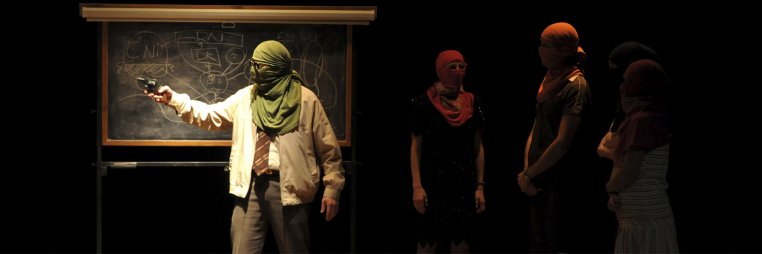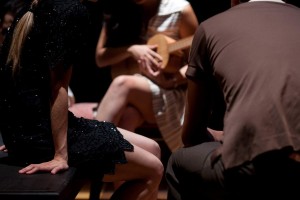“Everyone knows the system is bad. Why wait for it to collapse on its own?”
 Songs of mournful regret—the sort that characterize much of Latin American folk to the untrained ear—greet us as we enter the FringeArts space for Guillermo Calderón’s ESCUELA. As the show nears, the singers—their faces covered by colorful scarfs—switch to songs of revolution: “onward we march, comrades.”
Songs of mournful regret—the sort that characterize much of Latin American folk to the untrained ear—greet us as we enter the FringeArts space for Guillermo Calderón’s ESCUELA. As the show nears, the singers—their faces covered by colorful scarfs—switch to songs of revolution: “onward we march, comrades.”
Calderón invites us into a hidden school for Marxist revolutionaries in 1980s Chile. Instructors train a new cohort in small arms, homemade explosives, psychological warfare, conspiratorial best practices, and the ideology of class struggle. “¿Que es exploitation?” (what is exploitation?) asks one student.
We enter a world that only theater could show us. For 90 minutes, we are pupils in this peculiar boot camp (the five-member cast rotate between students and instructors). ESCUELA means “school” in Spanish (the show is in Spanish with English supertitles), and like a classroom teacher Calderón demands rather than seizes our attention. There’s not a lot of narrative in the piece, but the lessons are engrossing and a tension builds with every handling of a teaching-tool revolver or discussion of watching police. A quirky humor lightens the heavily pedagogical dialog.

Slowly a context emerges: these budding revolutionaries are part of a just struggle against right-wing dictator Augusto Pinochet. Pinochet was a repressive general who overthrew the popularly elected leftist government of Salvador Allende in 1973 with the help of the United States. But in 1988, the aging leader is preparing to hold a referendum on his rule. What role will there be for violent class warriors when popular sentiment can be expressed in a democratic process?
ESCUELA is an ideal theater piece for early 2016, as the presidential elections leave their beta phase and people start to exercise their democratic voices. In 1968, when student protests closed down Paris and threatened to devolve into another revolution of the kind that littered French history since 1789, President Charles de Gaulle called for new elections, a surprise move which quickly released the valve of protest. But as an instructor in ESCUELA might demand: a democratic society may have more freedoms, it’s elections might give an illusion of popular control, but do the exploitation and injustices of capitalism and the state that protects it remain?
For Calderón, once a member of a Marxist cell like that depicted, ESCUELA is a fond look back on an idealistic time. We see a little of the bloody consequences of the Revolutionary Left Movement’s violence. The characters, all well depicted, never remove their masks and are not developed as individual emotional beings. The blind dedication and unrealistic ideology seem dated and clunky. But this is beside the point: ESCUELA is a narrowly focused, transportative work, like entering a fading kodachrome snapshot.
[FringeArts, 140 N. Columbus Boulevard] January 28-30, 2016; fringearts,com.
